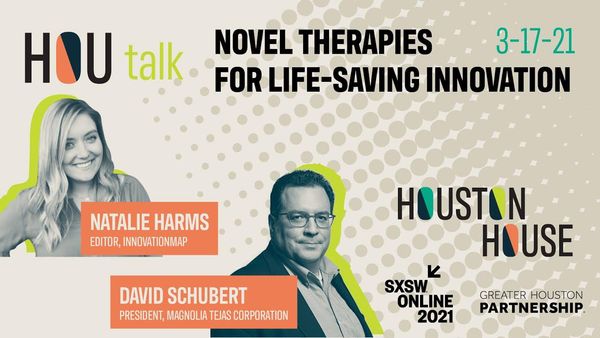Overheard: Houston's innovation leaders weigh in on the city's developing ecosystem at SXSW
EAVESDROPPING ONLINE
Another day of SXSW 2021 has concluded, and just like the first day, Houston innovators logged on to discuss technology and innovation that's taking off in town.
The second of the two days of programming focused on the development of the Houston innovation ecosystem — including how the city is factoring in diversity and inclusion into development — with interviews hosted by me, Natalie Harms, editor of InnovationMap. Missed out on the fun? Catch up with a few overheard moments from Houston House or stream the full interviews below.
"“We have to be true to ourselves of what works for Houston. Making sure the DEI is interwoven and in our DNA of our ecosystem so that we don’t make the same mistakes as other cities." — Ashley DeWalt, managing director of DivInc Houston

Video courtesy of the Greater Houston Partnership
Houston has an advantage in developing its innovation ecosystem because it can do so by learning from established ecosystems on the coasts. Locally, that means making diversity and inclusion a top priority. At a virtual SXSW Houston House panel, Ashley DeWalt, managing director of DivInc Houston, and Jan Odegard, interim executive director of The Ion, discuss the importance of prioritizing inclusion in developing Houston's innovation ecosystem. Click here to watch the full interview.
“This pandemic has really highlighted a lot of the health care disparities that are present within our systems. … Houston is in a unique position to address that.” — Fiona Mack, head of JLABS @ TMC

Video courtesy of the Greater Houston Partnership
The Texas Medical Center is the largest medical center in the world with over 10 million patients coming in annually — and JLABS @ TMC is right in the middle of that. With this access to patients and clinical trials, Houston has a lot of potential to attract new innovative companies solving the world's biggest health care problems. At a virtual SXSW Houston House HOU Talk, Fiona Mack, head of JLABS @TMC, discusses the momentum behind health tech innovation in Houston. Click here to watch the full interview.
“Whatever the training is, you have to actually create bias disruptors and points of friction and processes that change behavior. If we don’t have a way to implement what we learn, it doesn’t really change culture.” — LaTanya Flix, senior vice president at the GHP

Video courtesy of the Greater Houston Partnership
In light of the Black Lives Matter movement, corporations of all shapes and sizes were inspired to look inward to address inequity within their workforce — from training to shifts in workplace culture. At a virtual SXSW Houston House HOU Talk, LaTanya Flix, senior vice president of Diversity, Equity and Inclusion (DEI) at the Greater Houston Partnership, shares how she's on a mission to spread mindful DEI initiatives across all of the GHP's member organizations. Click here to watch the full interview.
“I see a world where I’m sitting in a boardroom, and I’m not the only woman anymore.” — Samantha Lewis, principal at Mercury Fund

Video courtesy of the Greater Houston Partnership
Women in venture capital are used to being the only women in the room and are fighting for that not to be the case for future generations. At a virtual SXSW Houston House panel, Sandy Guitar, managing director of the HX Venture Fund moderates a discussion with fellow women in VC, Paige Pitcher, director of innovation at Hines, and Samantha Lewis, principal at Mercury Fund. Click here to watch the full interview.
“There’s an incredible number of innovations that have popped up in Houston, but a lot of them have been centered around solving engineering-type problems at industrial scale — and that still exists, but doesn’t get as much coverage as consumer-facing technologies.” — Josh Pherigo, director of research and data analytics at GHP

Video courtesy of the Greater Houston Partnership
When tracking any sort of progress or growth, business look to their numbers and data. Houston's innovation system is no different. At a virtual SXSW Houston House HOU Talk, Josh Pherigo, director of research and data analytics at the Greater Houston Partnership, dives in deep with the facts and figures of Houston's burgeoning innovation ecosystem by following the venture dollars coming into local startups. Click here to watch the full interview.
“If you look at the density in Houston, being the energy capital of the United States, there are probably few places in the world where you can walk 15 minutes in either direction and talk to about 100 companies that would potentially be customers.” — Matthew Costello, CEO and co-founder of Voyager Portal

Video courtesy of the Greater Houston Partnership
A good startup idea comes from necessity and a way to apply technology to solve problems and shorten business delivery times, and the maritime shipping industry has a lot of opportunities for these types of innovations. At a virtual SXSW Houston House HOU Talk, Matthew Costello, CEO and co-founder of Voyager Portal, sets sail on a conversation about the maritime shipping industry — and how it was ripe with disruption. Click here to watch the full interview.
“You have institutions of exception in Houston where innovation flows from. The question isn’t that it’s not there, it’s how have we been tapping it.” — David Schubert, president of Magnolia Tejas Corp.

Video courtesy of the Greater Houston Partnership
Houston has a burgeoning life science innovation scene — but what's that next step for its development? At a virtual SXSW Houston House HOU Talk, David Schubert, president of Magnolia Tejas Corp. discusses the potential of Houston's world-class oncologists and biotech innovators have to make the city a hub for cancer innovation. Click here to watch the full interview.







 Apple doubles down on Houston with new production facility, training centerPhoto courtesy Apple.
Apple doubles down on Houston with new production facility, training centerPhoto courtesy Apple.





